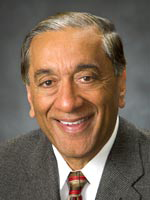
The provincial government has shortened the length of time it is proposing to ban third-party advertising before elections, but it will push ahead with changes that critics say will make it harder for people who are homeless or otherwise transient to vote.
"I think we ran something up a flag pole and it didn't fly like we thought it would," said Attorney General Wally Oppal. "It's always beneficial, in the public interest, to take a second look at these things."
The amendments announced on May 27 to Bill 42, the Election Amendment Act, cut the limit on third-party advertising from 120 days before the writ is dropped to 60 days, plus the 28-day campaign period. It leaves the amounts, $150,000 across the province and no more than $3,000 in a single constituency, intact. It also halves the amount political parties can spend in the 88 days before an election from $2.2 million to $1.1 million.
Inessential government ads (such as the Best Place on Earth campaign) are already restricted from running four months before election day as a matter of policy, the government's press release noted.
"I think we're doing the right thing by compromising," said Oppal. "We think the ban here is more reasonable. I think when you look at the 120 days, I think it could be argued and a court could say that the principle is sound but the length of the period is inordinate and is an infringement on the freedom of speech. I think that's the reason why we compromised."
Challenge expected
Oppal said the ban will start around February 15.
If the ban stands, it will give third parties little time to respond to the Liberal government's last throne speech and budget before the May 12, 2009 election.
No doubt the ban will be challenged in court, Oppal said. "I'm a lot more confident with 60 days than I was with 120 days. I have no trouble saying that in my view 60 days is reasonable."
NDP attorney general critic Leonard Krog said the changes do not go far enough. "They have made a huge political, constitutional and legal error," he said. "[Oppal] should be withdrawing this bill."
The changes are "an outrageous infringement on the right to free speech" and should not be made, he said. "The attorney general's like the proverbial fox in the hen house. They've been caught and they claim they were there just to inspect the place instead of steal the chickens."
ID requirement kept
The other part of the bill that has drawn heavy criticism is the requirement for greater proof from potential voters of their identification and address. The changes are similar to ones made by the federal government last year that are already being challenged in court.
Asked why he thinks the Liberals retreated on the election spending, but not the identification laws, Krog said, "Their intention here is to preserve political power. It is nothing more or less than that."
Where someone without identification showing their address could swear an oath in the past, now they will need another voter to vouch for them. Any one voter can only vouch for one other person.
Oppal defended keeping the tightened requirement. "I don't see how this makes it more difficult to vote," he said. "There are various ways that you can prove identification in order to have the right to vote."
"With great respect, I don't think the attorney general understands the impact of his own legislation," said Krog. "It will be harder for them. When you're homeless you're homeless. How do you get photo ID when you are homeless and have no money?"
Bill 'remains repugnant': BCCLA
"The legislation remains repugnant," said Murray Mollard, the executive director of the B.C. Civil Liberties Association. "It's a superficial response.... We consider the changes to be window dressing at best."
It's disappointing that the Liberals are keeping the changes to the identification rules, he said. As with the advertising rules, making identification requirements stricter seems to be partisan. It's the kind of thing that's more common in the United States than in Canada, he said.
Over the past 50 years Canada has made steps to extend the vote to everyone, he said. "This is a major step backwards."
Jim Quail, a lawyer and the executive director of the B.C. Public Interest Advocacy Centre, said, "It's obviously disappointing, but we'll be plugging ahead."
PIAC is already challenging the federal rules, he said, and the organization's lawyers are studying how to address the provincial legislation as well.
"What they don't understand is voting is a right not a privilege in this country," he said. "It's a right not a privilege and the government has no right to interfere with our right to elect, or unelect, them."
Related Tyee stories:
- Oppal's Murky Method for Changing BC's Election Laws
AG ignored many suggestions by electoral officer, plucked others from thin air. - Oppal Confused on Voter ID Law?
AG calls tightened requirements a 'good move' but cites report that says opposite. - Hot Button Bill: Libs Rush to Change Election Laws
Diverse foes say Bill 42 would crimp free speech, hurt poor voters.
Read more: Rights + Justice, Politics















Tyee Commenting Guidelines
Comments that violate guidelines risk being deleted, and violations may result in a temporary or permanent user ban. Maintain the spirit of good conversation to stay in the discussion.
*Please note The Tyee is not a forum for spreading misinformation about COVID-19, denying its existence or minimizing its risk to public health.
Do:
Do not: